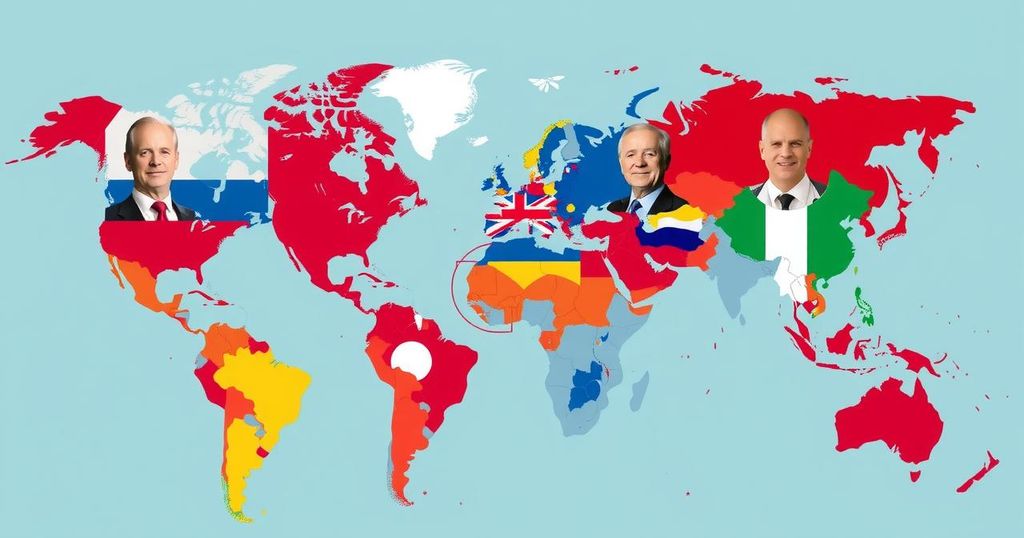Global Elections of 2024: A Year of Change and Anti-Incumbent Sentiments

The year 2024 witnessed a significant wave of electoral changes, with over 70 national elections leading to the decline of incumbents in both developed and developing democracies. Major gains were observed for conservative and liberal parties, while dissatisfaction with the global economy fueled this trend. Despite victories in some autocratic regimes, the overall sentiment reflected a strong anti-incumbent attitude, reshaping political narratives worldwide.
The year 2024 proved to be pivotal in global elections, witnessing the ousting of numerous incumbents across more than 70 national contests, which impacted over half of the world’s population. Major democracies, including India, the United States, and Indonesia, participated alongside 27 European nations electing a new European Parliament, culminating in an unprecedented total of over 1.6 billion ballots cast according to the International Institute for Democracy and Electoral Assistance.
The electoral results generally indicated voter discontent with the ruling parties, as every incumbent party in affluent nations experienced a reduction in vote share. Data from the ParlGov project revealed that this marked an extraordinary deviation from the norm, being the first recorded decline of this magnitude in nearly 120 years. Over 80% of both rich and impoverished democracies saw their incumbent parties lose either their legislative seats or overall support.
Among the noteworthy shifts, conservative parties gained ground in several regions, including the United States, where former President Donald Trump prevailed in battleground states. The center-right Democratic Alliance made significant gains in Portugal, while far-right parties expanded their representation in the European Parliament. Conversely, liberal opposition parties also capitalized on the anti-incumbent wave, achieving victories in the United Kingdom and South Korea.
Although some incumbent parties maintained power, they did so with diminished majorities, exemplified by India’s Bharatiya Janata Party, which lost its outright parliamentary majority in the June elections despite staying in governance through coalition support. Similar trends were observed in Japan, South Africa, and France, where polling showed a decline in incumbent support.
In contrast, less democratic nations exhibited different dynamics, with some governments skillfully controlling electoral outcomes to ensure victory. For instance, Rwandan President Paul Kagame faced no serious opposition, resulting in a 99% win, while Russian President Vladimir Putin was confirmed in a contest criticized for its lack of fairness. Nonetheless, slight indications of dissent emerged in countries such as Bangladesh, where Prime Minister Sheikh Hasina’s victory margin lessened, and in Iran, where voters opted for a moderate presidential candidate amid governmental controls.
Analysts suggest that widespread dissatisfaction with the global economy, notably rising costs, contributed significantly to declining support for incumbents. Notably, Mexico’s Claudia Sheinbaum offered a contrast, securing the presidency amid positive economic perceptions. Voter concerns further extended to issues like migration surges and the residual impacts of the pandemic, fostering a growing disenchantment with democratic participation.
While representative democracy remains a broadly acknowledged system, discontent with its functioning was evident, as revealed by a Pew Research survey. Many surveyed acknowledged that their elected representatives seemed inattentive to their perspectives, with substantial majorities expressing a lack of party representation for their views. Looking ahead, although 2025 will see fewer elections, pivotal contests in various countries may determine whether the trend against incumbents continues or if emerging factors influence voter decisions anew.
The landscape of global politics saw a significant shift in the year 2024, marked by extensive elections across a multitude of nations. With over 70 national elections held, the results reflected a notable discontent among electorates, particularly against incumbent parties in developed democracies. The trend suggests a broader sentiment of dissatisfaction regarding economic conditions and governance, influencing voting behavior across various political spectra. This context set the stage for the dramatic electoral outcomes seen in numerous countries.
In conclusion, the electoral events of 2024 highlight a pronounced shift against incumbents in many global democracies, as incumbents grappled with declining vote shares reflecting wider public dissatisfaction. Voter discontent driven by economic challenges and governance issues manifested in various electoral outcomes, leading to substantial political changes in several countries. As the world approaches future elections in 2025, the underlying sentiments will be crucial in shaping voter behavior and determining the political landscape.
Original Source: www.voanews.com







